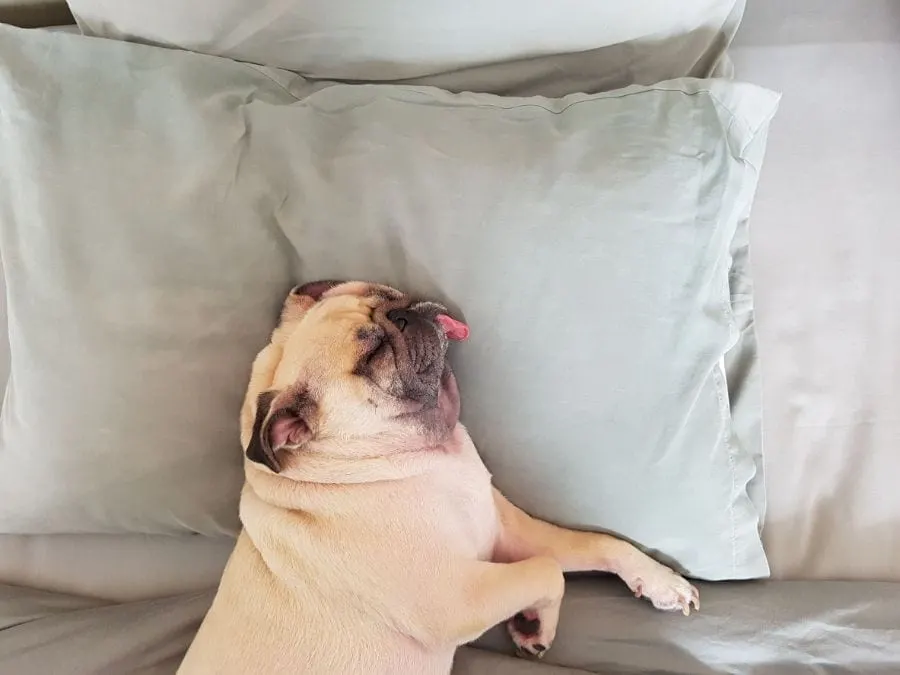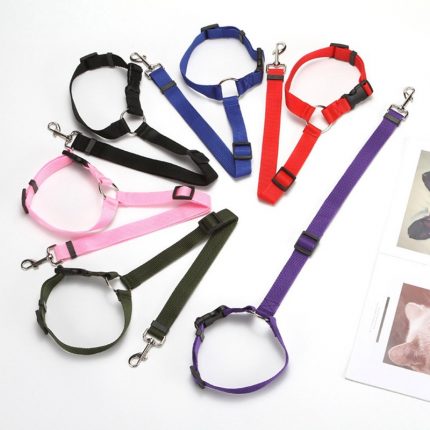Why Do Dogs Lick Pillows: Unraveling the Canine Behavior
Dogs, our furry companions, never cease to amaze us with their peculiar behaviors. One such behavior that often leaves pet owners puzzled is their tendency to lick pillows. If you’ve ever caught your beloved canine friend engaged in this seemingly odd activity, you may have wondered what could possibly be the motivation behind it. In this article, we delve into the intriguing world of dogs and their pillow-licking habits, exploring the various theories and explanations put forth by experts.
The act of dogs licking pillows can be observed in various breeds and ages, leaving no room for exclusivity. While it may seem harmless or even amusing at first glance, understanding the underlying reasons behind this behavior is crucial for responsible pet ownership. Some theories suggest that dogs lick pillows as a form of self-soothing or to alleviate anxiety. Others propose that it may be a way for dogs to mark their territory or establish a sense of familiarity in their environment.
To truly comprehend this behavior, we must also consider the sensory aspect. Dogs possess an incredibly heightened sense of smell, and pillows often carry scents that are comforting or familiar to them. It’s not uncommon for dogs to seek solace in the scent of their owners or other family members, and pillows, being frequently used objects, retain these scents. Thus, licking pillows may serve as a way for dogs to reinforce their bond with their human companions.

Additionally, the texture of pillows may play a role in this behavior. The softness and pliability of pillows can provide a tactile experience that dogs find pleasurable. The act of licking may release endorphins, creating a sense of relaxation and contentment. It’s possible that dogs have discovered the pleasurable sensation of licking pillows and continue to engage in this behavior as a form of self-gratification.
While the exact reasons behind dogs licking pillows may remain somewhat elusive, it is important to monitor this behavior and ensure it does not escalate into compulsive licking or cause any harm to your pet. In the following sections, we will explore practical recommendations to address this behavior and provide a safe and enriching environment for your furry friend.
Join us as we embark on this fascinating journey into the world of canine behavior, shedding light on the enigma of why dogs lick pillows. By gaining insight into this seemingly peculiar behavior, we can deepen our understanding of our four-legged companions and strengthen the bond we share with them.
Unraveling the Mystery: Why Do Dogs Lick Pillows?
1. Self-Soothing and Anxiety Relief
One possible explanation for dogs licking pillows is that it serves as a self-soothing mechanism to alleviate anxiety. Dogs, like humans, can experience stress and anxiety, and licking can provide them with a sense of comfort and security. The repetitive motion and the act of licking can release endorphins, which have a calming effect on their nervous system. By licking pillows, dogs may be seeking a form of emotional relief, especially when they are feeling anxious or uncertain.
2. Territorial Marking and Familiarity
Another theory suggests that dogs lick pillows as a way to mark their territory and establish a sense of familiarity in their environment. Dogs have scent glands in their mouths, and licking objects, including pillows, can leave their scent behind. This behavior may be an instinctual way for dogs to claim ownership over their surroundings and create a sense of security. Moreover, pillows often carry the scent of their owners or other family members, which can provide a source of comfort and familiarity for dogs.
3. Sensory Stimulation and Pleasure
The texture and sensory experience that pillows offer may also play a role in dogs’ inclination to lick them. The softness and pliability of pillows can be enjoyable for dogs, and the act of licking may provide a pleasurable tactile sensation. It is possible that dogs have discovered the gratifying feeling of licking pillows and continue to engage in this behavior as a way to experience sensory stimulation and seek pleasure.
Practical Recommendations: Addressing Pillow-Licking Behavior
1. Provide Alternative Chewing Options
To redirect your dog’s attention away from pillows, offer them alternative chewing options, such as sturdy chew toys or dental chews. These can provide the oral stimulation and satisfaction that dogs seek when licking pillows. Make sure to choose toys that are safe and appropriate for your dog’s size and breed.
2. Increase Mental and Physical Stimulation
Boredom and lack of stimulation can contribute to unwanted behaviors, including pillow licking. Ensure that your dog receives plenty of mental and physical exercise throughout the day. Engage them in interactive play, provide puzzle toys, and take them for regular walks or runs to keep their minds and bodies active.
3. Create a Calming Environment
If your dog’s pillow licking is triggered by anxiety or stress, create a calming environment for them. Provide a designated safe space where they can retreat to when they feel anxious. Use calming aids such as pheromone diffusers or soothing music to help alleviate their anxiety. Consult with a veterinarian or animal behaviorist for additional guidance.
4. Seek Professional Help if Needed
If your dog’s pillow licking becomes excessive, compulsive, or starts causing harm, it may be necessary to seek professional help. A veterinarian or certified animal behaviorist can assess the underlying causes of the behavior and provide tailored guidance or behavior modification techniques to address the issue effectively.
Conclusion
In conclusion, understanding the behavior behind Why Do Dogs Lick Pillows can provide insights into your pet’s health and emotional state. For a deeper dive into this topic, visit geepets.com, where you’ll find comprehensive resources and expert advice on a wide range of canine behaviors and how to manage them. Additionally, exploring external resources such as American Kennel Club can offer further information on dog behaviors, health tips, and how to nurture a happy, healthy relationship with your furry friend. Both these platforms serve as valuable tools for pet owners looking to understand and improve their pets’ well-being.

Practical Recommendations: Addressing Pillow-Licking Behavior
1. Provide Alternative Chewing Options
Offer your dog a variety of chew toys specifically designed for their size and breed. Opt for sturdy, durable toys that can withstand their chewing habits. By redirecting their attention to appropriate chewing items, you can help deter them from licking pillows.
2. Increase Mental and Physical Stimulation
Ensuring your dog receives ample mental and physical exercise throughout the day is crucial in addressing the question, “Why do dogs lick pillows?” Engage them in interactive play sessions, which not only keep them physically active but also mentally stimulated, providing a direct answer to the concern of “Why do dogs lick pillows?” Additionally, offering puzzle toys that challenge their problem-solving skills can divert their attention from behaviors such as pillow licking, thereby providing a practical solution to the query, “Why do dogs lick pillows?”
Taking your dog for regular walks or runs is essential in releasing pent-up energy, which is often a contributing factor to the question, “Why do dogs lick pillows?” A tired dog, enriched with physical and mental exercises, is less likely to engage in undesirable behaviors like pillow licking. This approach directly addresses and mitigates the root causes behind “Why do dogs lick pillows?” ensuring that your furry friend is engaged, satisfied, and less inclined towards such behaviors.
3. Create a Calming Environment
If you’re pondering the question, “Why do dogs lick pillows?” and you’ve noticed that your dog’s pillow licking is triggered by anxiety or stress, it’s crucial to create a calm and soothing environment for them. To address the concern of “Why do dogs lick pillows?” consider designating a safe space where they can retreat when feeling anxious, such as a cozy crate or a quiet corner of the house. This approach can be particularly effective if you’re trying to understand and mitigate the reasons behind “Why do dogs lick pillows?”
In addition, incorporating pheromone diffusers or playing soothing music can help alleviate their anxiety, directly addressing the root of the question, “Why do dogs lick pillows?” By understanding and addressing the underlying causes, such as anxiety or stress, you can create a more comfortable and reassuring environment for your dog, which can help reduce or eliminate the behavior that leads you to ask, “Why do dogs lick pillows?”
4. Practice Positive Reinforcement
5. Seek Professional Help if Needed
If you’re wondering, “Why do dogs lick pillows?” and you notice your dog’s pillow licking becomes excessive, compulsive, or causes harm, it may be necessary to seek professional help. This behavior, often encapsulated in the question “Why do dogs lick pillows?” can be indicative of underlying issues that need addressing. Consulting with a veterinarian or certified animal behaviorist is crucial when you find yourself repeatedly asking, “Why do dogs lick pillows?” as they can assess the underlying causes of this behavior.
They will provide tailored guidance or behavior modification techniques specifically designed to address the root of the question, “Why do dogs lick pillows?” Their expertise can help determine whether this behavior is a sign of anxiety, boredom, or a health issue, thereby offering solutions to reduce or eliminate the behavior. So, if the question “Why do dogs lick pillows?” reflects a concern for your pet’s well-being, professional insight is invaluable in ensuring your dog’s health and happiness.
6. Maintain Consistency
Consistency is key when addressing any unwanted behavior, including the curious case of “Why Do Dogs Lick Pillows.” Ensure that all members of your household are on the same page and follow the recommended strategies consistently, especially when you’re puzzled by behaviors like “Why Do Dogs Lick Pillows.” Inconsistencies in training or management can confuse your dog and hinder progress in understanding and addressing the reasons behind “Why Do Dogs Lick Pillows.”
It’s essential that every approach towards modifying or understanding behaviors associated with “Why Do Dogs Lick Pillows” is applied uniformly by everyone involved. This unified approach not only helps in addressing the immediate question of “Why Do Dogs Lick Pillows” but also ensures that your dog receives a clear and consistent message, reducing confusion and promoting faster adaptation to desired behaviors.
7. Consider Taste Deterrents
Some dogs may respond to taste deterrents applied to pillows or other objects they are prone to licking, a behavior that often leads to the question, “Why do dogs lick pillows?” These deterrents are designed to have an unpleasant taste, discouraging dogs from engaging in the behavior that sparks the question, “Why do dogs lick pillows?”

Consult with your veterinarian for safe and appropriate taste deterrent options to address the issue underlying the frequent inquiry of “Why do dogs lick pillows?” This approach can help mitigate the behavior associated with the curiosity of why dogs lick pillows, ensuring your pet’s habits are healthy and not destructive. The use of these deterrents can be a strategic response to the often-asked question, “Why do dogs lick pillows?” providing a solution that discourages the licking behavior effectively.
8. Regular Veterinary Check-ups
Schedule regular check-ups with your veterinarian to rule out any underlying medical conditions that may contribute to your dog’s pillow-licking behavior. Certain health issues, such as gastrointestinal problems or allergies, can manifest in unusual behaviors, including excessive licking.
Remember, every dog is unique, and what works for one may not work for another. Be patient, observe your dog’s behavior closely, and adapt your approach as needed. With time, consistency, and proper guidance, you can help redirect your dog’s licking behavior and create a harmonious environment for both you and your furry companion.















